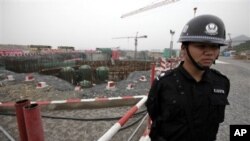Chinese leaders are vowing to press ahead with their ambitious nuclear energy plans despite the nuclear crisis in Japan. Experts say nuclear energy is essential because of China’s continually growing energy demands, combined with efforts to reduce greenhouse gas emissions.
China’s nuclear vision is clear. There are 13 nuclear power reactors in operation in China. The World Nuclear Association last week said China has more than 25 nuclear power reactors under construction, and more about to start construction soon.
Following the disasters in Japan, the official Xinhua News Agency says China is suspending approval for new nuclear plants so that authorities can revise safety standards and do safety checks at existing plants.
But in the only public and official comment so far, Vice Minister of Environmental Protection Zhang Lijun says China will maintain its overall nuclear energy policies. He spoke to reporters on the sidelines of the annual session of the National People’s Congress, one day after the Japan earthquake.
Zhang says China can learn lessons from Japan, but will not change its plan for developing nuclear-power.
Nuclear power now makes up only about one percent of China’s energy mix, but the recently approved five-year plan includes quadrupling nuclear energy’s share by 2015.
Shi Dinghuan is an energy advisor to the State Council, which is China’s Cabinet. Shi says Japan’s nuclear crisis will draw official Chinese attention to the issue of nuclear safety standards. But he says China will not change its overall policy or strategic direction "just because of a big natural accident in another country."
Shi points out the United States has also announced its policies to pursue nuclear power are not changed.
He advocates greater efforts to expand energy generated from renewable sources, such as wind and the sun. But he says he believes nuclear power needs to remain in the mix, especially since China’s energy demand will keep increasing as economic growth continues.
Tsinghua University School of Public Policy Associate Professor Wang Haibin is an expert on China’s civilian nuclear industry.
He says there has been a quickening of the pace of nuclear-power development in China in recent years, including an official target of about 70 nuclear reactors in China by 2020.
Wang says if this speed is maintained, he thinks there could be problems with safety at nuclear plants, including problems with construction materials and other preventative measures.
At the same time, he points out that the events in Japan are still unfolding and says he thinks it is possible the Chinese government may still adjust its targets accordingly.
The nuclear facilities being built in China rely on newer technology that officials hope will be safer than the ones in Japan.
China Nuclear Power Engineering Corporation Vice President Liu Wei told Japan’s Asahi Shimbun newspaper last week that China can put up nuclear-power facilities faster than in Japan. He said one reason is in China, officials do not encounter opposition from the local communities.
Greenpeace’s Li Yan says she thinks one reason there is little public opposition to nuclear power in China is because Chinese people do not know much about it.
"First of all, energy policies are made in a very top-down approach. It is a very elite discussion and nuclear energy so far is not a big percentage in China, and Chinese people have many more other issues to worry about, especially burning coal and its pollution to water and air," said Li Yan. "And so, at that level, you do not see really hot debate on nuclear as an energy type."
She says there is also a problem in China that the government in the past has been secretive and not readily willing to disclose information.
Nevertheless, the Japanese nuclear disaster is helping to raise Chinese people’s awareness of nuclear power and a debate on the dangers and benefits of nuclear power is beginning on the Internet
Like Japan, China is an earthquake-prone country, and some Chinese expressed their concern a quake could damage a nuclear facility. Others expressed frustration that, unlike some leaders in Europe, Chinese leaders are not reconsidering their policy of pursuing nuclear power.
At the same time, some Chinese supported nuclear power and echoed the government’s comments that nuclear energy is less polluting than coal or oil.




